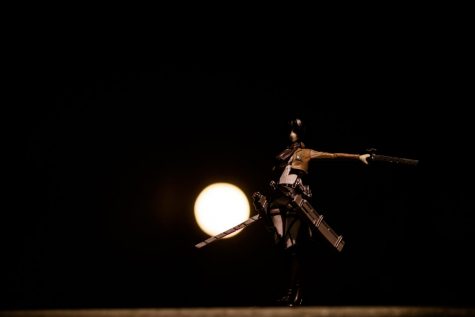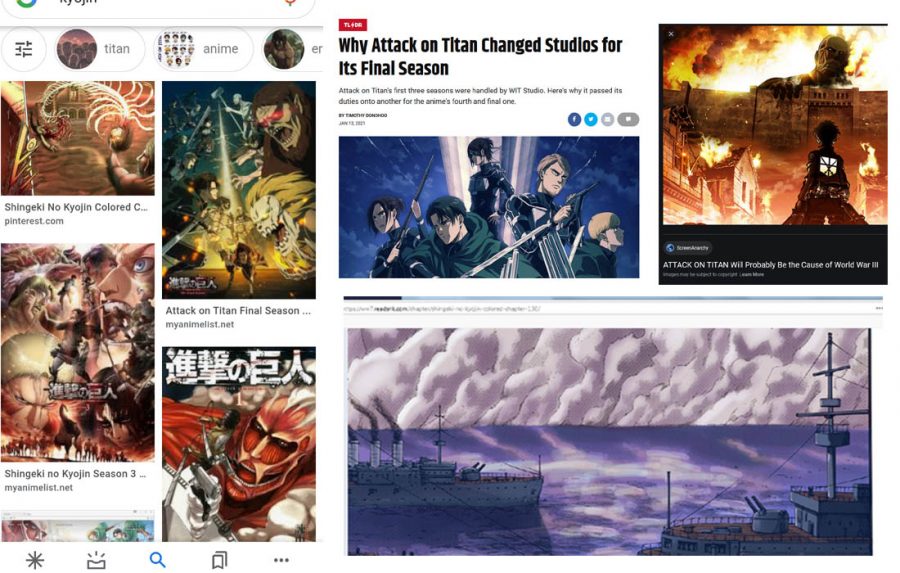The Coming End of the Japanese Manga Series ‘Attack on Titan’
Hajime Isayama, the author of the beloved series, announced that the final chapter of the manga will be released in less than two months. Has the anime adaptation so far satisfied expectations?
(Photo Montage by Carissa Wu )
The end of the ‘Attack on Titan’ series is creating numerous new discussions on various websites.
You live your life with your family on an isolated island surrounded by walls. It is peaceful here, but you and others on the island feel trapped not knowing what exists in the outside world, like sheep herded in a pen. One day, a new face appears above you, its form towering well above the walls everybody thought were impenetrable. With one steady kick, the walls topple over. On a day that was supposed to be peaceful, your small world is now run over with man-eating giants and fallen debris, causing destruction and chaos under a forever darkening sky.
With a single episode, the Japanese manga series Attack on Titan was able to establish emotions and bring life to a story in a way no one thought was possible. Not only was the premise of walls keeping out people-eating Titans fascinating to many viewers, but many viewers were left speechless by the show’s intensity.
The story starts in a land called Paradis, where we are introduced to our protagonist, Eren Jaeger. We understand his character and personality as he interacts with his friends, Armin and Mikasa, and through his dreams of the outside world. We see his frustration towards the walls, which kept him and the others safe, but also kept them from their freedom. We see his admiration of the Survey Corps, warriors with specialized weapons that can vanquish Titans and persist through danger daily in order to find a solution to what the Titans are. Although many people complain that Eren is portrayed as loud and abrasive, it is reasonable that he would be flawed at the beginning, especially at only 10 years old.
However, all of what Eren knew was quickly shattered as both the Colossal and Armored Titans broke through Paradis’ defense, allowing hundreds of Pure Titans to rush in and eat civilians. Because the Survey Corps are on a journey, everyone is left vulnerable. Screams and cries of terror run rampant in this episode, and it is through these moments that Attack on Titan is able to convey a wide range of emotions. Throughout the rest of the series, Eren, still haunted by the visions that he saw that day, joins the Corps along with his friends, determined to vanquish every last Titan that ruined the lives of the people dear to him.
Although the show is labeled as a shounen, “a genre of Japanese comics and animated films aimed primarily at a young male audience, typically characterized by action-filled plots,” as defined by Oxford Languages Dictionary, it differs from other animes through its unique plot and character development. As the show progresses, many of the characters mature as they are forced to continuously make difficult decisions that call for sacrifice. Tanzim Ali ’24 said, “There are many parts of the anime that I like, such as the cast of characters, the deep plot, and the themes that it introduces. Few characters fall into stereotypes, unlike other anime, and each core cast member is unique in their own way. They are the protagonists of their own arcs so they are expendable at any moment, making the stakes higher.”

Others fell in love with the show due to its mystery. Because of its premise, Attack on Titan constantly makes the viewer think and ask questions: where do Titans come from? Why do they eat people? What is beyond the island’s walls? All of this can make a viewer fascinated and curious enough to continue watching the show. “The show makes you pay close attention as you try to decipher the strange world it places you into,” said Wesley Nielsen ’22. “The thing is, with each reveal, it seems like the show moves away from themes about humanity, in service of plot.”
While anime fans still love the show, it has taken a few hits, especially as it is drawing closer to its ending in April 2021. Complaints about a change in studios for animating the final season of the show have gotten so extreme that the new studio, Mappa, has put forth a message for Twitter users to stop harassing their staff. Still others have decided to boycott the series due to controversy over series creator Hajime Isayama’s political views.
Either way, there is little doubt that Attack on Titan has been successful. As of December 2019, the manga sold over 100 million copies in print worldwide, making it one of the best-selling manga series of all time. It has also won several awards. Various websites house cosplay and fanfiction, showing the inspiration for creativity in the fanbase. People even visit the Attack on Titan theme park in Japan, which features scenes from the manga. It seems as though despite all of the critiques, there is something that still draws more and more people to the story, like moths to a flame, even as the characters suffer.
As Hajime Isayama described it in a BBC interview, “When I first came up with the idea, I had a dream with no limits. In my tiny room, I felt I was connected to the universe like I’ve seen the ordinary world. The structure of the story that there are walls and outside the walls there are monsters and inside the walls there are different classes within society, I think those concepts are universal.”
And with that, the ordinary world in Attack on Titan continues, even after the conclusion of the series.
“When I first came up with the idea, I had a dream with no limits,” said Hajime Isayama, the creator of Attack on Titan.
Carissa Wu is a Staff Reporter for 'The Science Survey,' and she enjoys writing journalistic articles. Carissa enjoys doing interviews to find out other...











